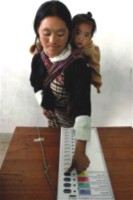|
Neighbours
A Scheme of Establishing King's Party?
Hari Prasad Adhikari
 |
Bhutan held a mock election last month. |
On the third week of April 2007, King Jigme Singe Wangchuk and his son's government (KJSW and G) completed the well-calculated drama of so-called first Mock election in Bhutan. The second round of the drama is yet to be played on May 28, 2007 by conducting another mock election. These dramas are popularised on the pretext of educating people for the forthcoming general election of 2008 for the preparation of the so called parliamentary system where the king will be the supreme head above the upper house , lower house, supreme court, election commission and the constitution of Bhutan by acquiring all political power constitutionally.
Further, he will be the supreme commander of all the three armed forces: Royal Bhutan Police, Royal Bhutan Bodyguard and Royal Bhutan Army. In addition, there is no bar on him to monopolise the country's exchequer as well as other natural resources of the country. The department of Anti-Corruption and Audit is a mere spectator and has no power in front of the kings and the royal secretariat.
In order to move ahead towards this goal, Druk Yellow Party (DYP) is established to influence the Bhutanese people and once again emphasise on racialist chauvinism through its new manifesto released on April 4, 2007. Ridiculously, according to the election commission (EC), no political parties are allowed to place their election manifesto or organise political campaigns. Further, the candidates who are willing to contest the election are not allowed to fill their nomination paper or his/her candidature in the office of the election commission. In this connection, DYP has been established for the continuity of racialism with the aims and objective borrowed from the concept of one nation, one people and Driglam Namja, the ethnic cleansing policy introduced by King Jigme Singay in 1985.
The DYP's manifesto states, "Druk Yellow Party believes in ensuring the unity of our country through preservation of our tradition, culture and values. For all time to come, Bhutan will remain united, independent and with rich cultural heritage intact. Believing that our unique and vibrant culture ensures continued sovereignty, security and unity of our country while offering economic opportunities, we shall strive to preserve and promote our tradition, culture and values".
The king's party does not mention a single word regarding establishment of democracy and human rights, political, civil and economic liberalisation and to end the ongoing ethnic cleansing. To fool the people of Bhutan, DYP has chosen Yellow colour that is the colour of the upper part of the National flag and scarf (Kabne) of king, crown prince and Je Khempo (Head lama appointed by king). These elements have special privileges in Bhutan and are not permitted to disobey and dishonor according to the TsaWa Sum and the newly brought constitution.
Likewise, the colour of the Red party ( which would be the established second party for opposition in the parliament ) is another instrument brought for supporting the king's party. Its colour is related to the scarf of the officials, who are appointed by the king in the various ministries as his right hand to perform the dictated assignments. Thus, the remote control of the red party also remains in the hands of the royal palace.
Helplessly, about 125,000 encircled voters (though selected by EC) out of 400,000 participated in the drama; DYP secured only 55,531 votes by virtue of several restrictions in the process of performance. For example, the EC refused to issue voter's identity cards to those who were relatives of people involved with political parties formed in exile. For instance, supporters of Druk National congresses (Kuenlay led and Thinley led), Bhutan People Party, Bhutan National Democratic Party, Bhutan Gorkha Liberation Party and Bhutan Communist Party formed underground within Bhutan were not permitted to participate in the election. Actually, these parties could garner huge mass support when allowed to function and given the opportunity to campaign freely with their plan, program and manifestos. Therefore, the claim of honouring and respecting democracy by the racist king and his puppet government is only a gimmick and eye-washing tactic to donors and the citizens of Bhutan.
Otherwise KJSW and his son's G would have allowed the political parties formed in exile to function. Also it would take steps to repatriate the Bhutanese refugees who are comparatively more aware on democracy and human rights.
Reprinted by arrangemet , The Kathmandu Post
Copyright (R) thedailystar.net 2007 |
